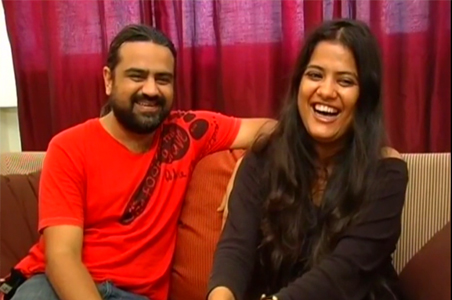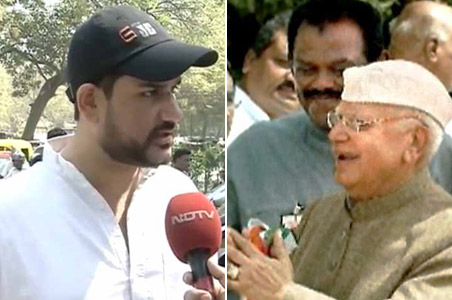
Cupid struck Bapu and Manish 17 years ago and for the past 12 years, they have been living together, happily unmarried.
The couple who have been together since school began their journey living-in from small town Jodhpur.
Manish Hariprasad, Media Professional says, "In Rajasthan, when you are coming from a pre-dominantly madu world it does become a little bit of problem. I mean, I've had an orthodox family, she's had an orthodox family and yes there were problems initially. I mean not just the family, we used to live together in Jodhpur in my house and there were enough number of times police came in and asked us OK, who is this girl? What are you guys doing together? Is she your wife? I mean beyond a wife, even a fiancee or a girlfriend is not understood in those places. So yes it did become more difficult. There were enough number of times nieghbours actually complained to the Police..."
"See I think the kind of background we come from, problems occurred. People are not as open to the kind of thing that you have started living in together. There is always insecurity from your side of the family. What if it doesn't work out? What if you leave each other?", says Bapu Deedwania, a journalist by profession.
Problems that Manish and Bapu have learnt to work around.
Manish moved to Mumbai to work in advertising Bapu followed 5 years later. Life in Mumbai has been easier.
So we ask them what they think of the Supreme Court's recent endorsement of live-in relationships.
"I wish they would have said it 17 years ago, some of the problems that we faced during that live-in period would not have occurred, it's fine now. In fact the only few times I have thought about marriage has been when I have not been able to put her name in the insurance policy, in medi-claim. When I have not been able to put her as a nominee in all those forms that require the so called relationship status. Which is which is.. So yes those are the times when you think if the Supreme Court actually did away with the whole dependency on marriage.", says Manish.
"Or may be like have a separate column married, single, live-in.", Bapu adds.
"Or partners but yeah it is a problem.", says Manish
For Manish and Bapu it was the stamp of cupid that mattered. The Supreme Court's endorsement gives cupid the stamp of authority but while the moral brigade might get agitated the love brigade is just not complaining.


 3:36 AM
3:36 AM
 sha
sha

 Posted in:
Posted in: 
 Gandhinagar: The questioning of Gujarat Chief Minister Narendra Modi in connection with the Gulbarg riots post-Godhra is a "very big step forward" in trying to understand and unravel the mysteries in the case and the SIT will submit its report to the Supreme Court on or before April 30, its head RK Raghavan said on Sunday.
Gandhinagar: The questioning of Gujarat Chief Minister Narendra Modi in connection with the Gulbarg riots post-Godhra is a "very big step forward" in trying to understand and unravel the mysteries in the case and the SIT will submit its report to the Supreme Court on or before April 30, its head RK Raghavan said on Sunday. Raghavan said that the petition of Zakia Jafri, wife of former Congress MP Ehsan Jafri who was killed along with 68 others in the Gulbarg Housing Society riots in 2002, was the SIT's "
Raghavan said that the petition of Zakia Jafri, wife of former Congress MP Ehsan Jafri who was killed along with 68 others in the Gulbarg Housing Society riots in 2002, was the SIT's "

 Sandip Soibam (left) and Nikhil Hidangmayum exchange rings during the first ever public gay marriage at an auditorium at Chingamakha in Imphal West District on Thursday.
Sandip Soibam (left) and Nikhil Hidangmayum exchange rings during the first ever public gay marriage at an auditorium at Chingamakha in Imphal West District on Thursday. 






